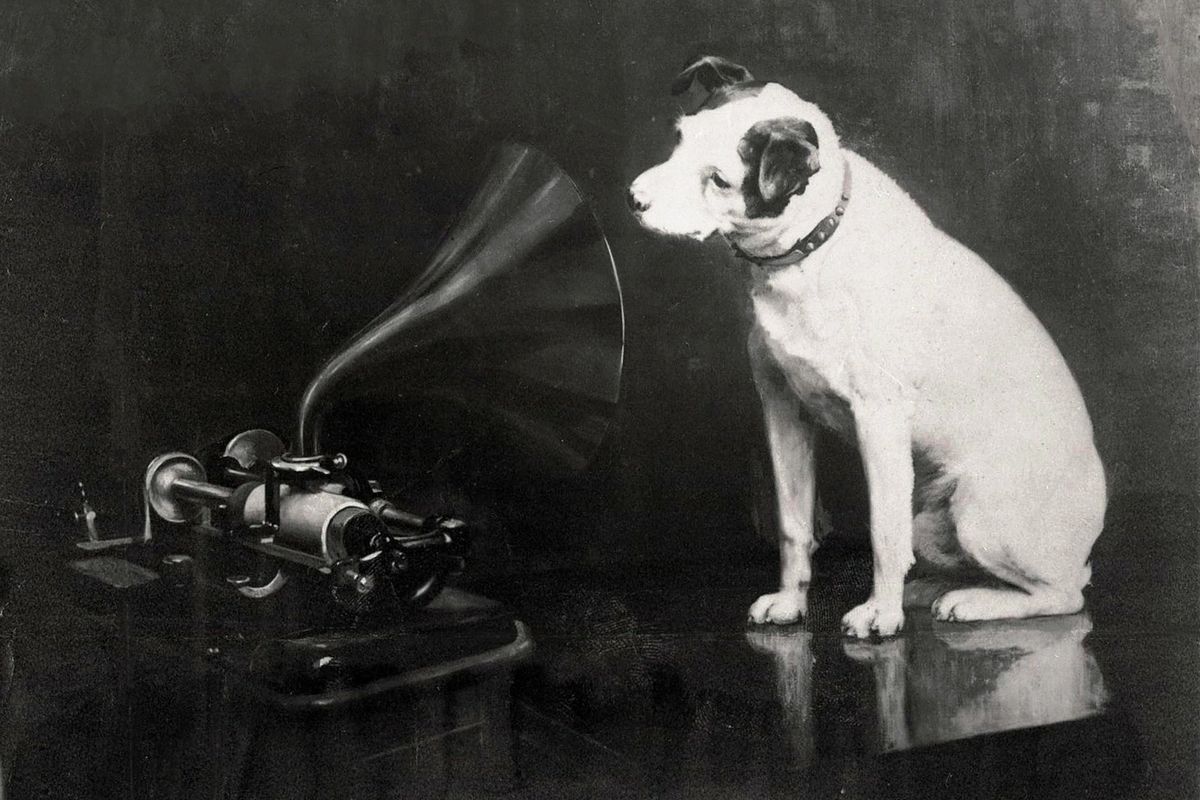Dogs are listening in on your conversations more than you might think, according to research
Did someone say pizza?

A dog listens to a phonograph.
We know that, adorably, dogs actually love baby talk. And now, a new study suggests that they might be able to pick out words, even when we're not talking directly to them in a sing-songy way.
So let's say you're speaking to your roommate: "Hey, make sure to pick up a pizza on the way home. I'd do it, but I have to walk Fido before we go to the vet." Chances are, even though Fido isn't being directly engaged, he recognizes keywords. Home. Fido. Walk. Vet. Maybe if Fido is sophisticated, he knows the word pizza. (And if Fido is super sophisticated, he knows the words Meat Lovers with extra cheese.)

The research, published in the journal Animal Cognition, found that dogs indeed can sometimes translate our language. To test this out, "Dogs were played recordings of their owners reading a meaningless text which included a short meaningful or meaningless phrase, either read with unchanged reading prosody or with an exaggerated DDS prosody." In layman's terms, different levels of enthusiasm and intonations were used by owners when reading to their dogs.
Many have joked for ages that dogs only hear word salads when humans are talking. But this just isn't true.
- YouTube, @FrenchieFlixwww.youtube.com
In Joshua Askew's piece "Dogs 'eavesdrop' on humans" for BBC News, he writes, "Dogs have the neurological capacity to pick out information relevant to them when hearing humans talking." He cites the study, which was led by David Reby, professor at the University of Sussex, who wrote, "Our research shows that dogs are able to pick out and recognize words relevant to them in a monotonous stream of otherwise irrelevant speech, even in the absence of the intonation cues we usually use to engage them."
Askew also references another researcher who worked on the study—Dr. Holly Root-Gutteridge, a postdoctoral research fellow at the University of Lincoln. She makes the distinction that they specifically address the difference between dogs hearing a happy, high-pitched voice, as is common in baby talk, from regular speech. Dogs do perk up when they hear "good dog," but that's usually because it's in an exaggerated tone.
She concluded, "The results show just how good dogs are at listening to us and how much they understand of what we say."
Just over 50 big and small breeds, "from Dachshunds to St. Bernards," were part of this research, with more hopefully on the way. One focus will be whether or not wolves and other non-domesticated animals have this capability, as well. Furthermore, Askew notes, "Researchers say they plan to test the age that puppies become responsive to human speech."

X user @MarioNawfal posted the study and garnered a few adorable reactions. One asks, "What if—all dogs are actually spies and are reporting info to their government, so they can plan to take over the world?"
Others seem annoyed that extensive research is being done to reach such an obvious conclusion. Says another, "Dog owners everywhere already know this. That is why we spell or use code words or avoid certain words unless said with the intent to communicate with the dogs."

This commenter gives an example: "My old roommate, to me: '[So&so] is coming over!' —We would immediately hear a jingle of the dog's collar, we look over, and the dog's ears are now perked up."
And this is just truth: "Well duh. Mine is always listening. He could hear his name whispered from a different floor."





 Courtesy of Kerry Hyde
Courtesy of Kerry Hyde Courtesy of Kerry Hyde
Courtesy of Kerry Hyde Courtesy of Kerry Hyde
Courtesy of Kerry Hyde Courtesy of Kerry Hyde
Courtesy of Kerry Hyde A newborn baby with her Teddy bear. (Representative image)via
A newborn baby with her Teddy bear. (Representative image)via  Traditional strawberry farming takes up a lot of land.
Traditional strawberry farming takes up a lot of land. season 7 episode 6 GIF
season 7 episode 6 GIF diane guerrero latina GIF by Identity
diane guerrero latina GIF by Identity Dexters Laboratory Type GIF
Dexters Laboratory Type GIF